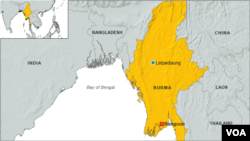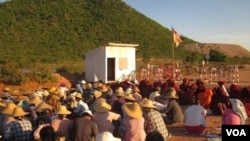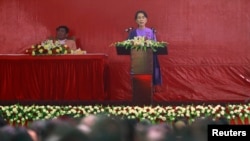BANGKOK —
Burma has recommended a controversial China-backed copper mine continue, despite objections from protesting villagers. An official investigation, led by opposition leader Aung San Suu Kyi, concludes the project would benefit the nation as long as some recommendations are met.
In a 74-page report, the investigation commission acknowledges Burma's Letpadaung copper mine failed to meet international environmental and social impact standards or adequately compensate villagers for lost land.
The report also acknowledges that police used smoke bombs containing phosphorous against protesters opposed to the project, severely burning more than 100 people, despite earlier denials by authorities.
However, rather than recommending the project end or be suspended, the report gives suggestions for meeting international standards.
It says stopping the China-backed project, as protesters have demanded, would discourage future foreign investment.
President Thein Sein appointed the commission and it was chaired by opposition leader Aung San Suu Kyi.
Presidential spokesman Ye Htut says, once the report's suggestions are followed, the mine will benefit not only the state but also the local population.
"Suggestions in every sector. Law and rule of law and environmental and also the social impact and creating the job opportunity for the local people. And, to review some parts of the current agreement between the Myanmar and Chinese company," said Ye Htut.
The mine, the largest of its kind in Burma, is jointly run by Burma and China military-connected companies under a deal that dates to the previous military government.
Last year's villager-led demonstration against expanding the mine was broken up violently by police. More than 100 protesters, including monks, were severely injured, with signs of chemical burns.
An independent Burma lawyers network and rights group say police used white phosphorous grenades as a chemical weapon to scare off opponents of the project.
The incendiary agent is used to create smoke screens, but can cause severe burns and fire if used against people or near flammable objects.
Burma authorities initially denied using the chemical. But, the report acknowledges smoke bombs did contain phosphorous. It blames a lack of police training for causing the protesters injuries.
The head of the legal committee for the Upper Burma Lawyers Network, Thein Than Oo says the report does not adequately address the issue of responsibility.
"The main facts they omit is who commit the crime to the peaceful demonstrator[s] with white phosphorous smoke bomb[s]. And, how to deal with this crime? They don't mention it," said Thein Than Oo,
Aung San Suu Kyi's role unclear
Despite Aung San Suu Kyi's heading the investigation, Thein Than Oo does not blame the democracy icon for what he says is an unsatisfactory report. He says her influence was limited because many commission members were loyal to the government.
It is not clear how much of the final report was approved by Aung San Suu Kyi.
Her spokesman, Nyan Win, was not immediately available by phone to comment.
Villagers complain mine pollution poisoned nearby water supplies and that they received inadequate compensation for land used for the project.
Ye Htut says the report acknowledges payments for villagers' land was poorly handled.
"Some of the process to giving the compensation is not transparent enough. And, some are given by the value under the current… lower than current value. And, so they have to review on that process. And, also… the company should be reclaiming the other land for... to substitute the land lost by the local people," said Ye Htut.
President Thein Sein has appointed a new commission to implement the report's recommendations.
But Thein Than Oo says that commission, made up of ministers and company representatives, is far from independent and should include activists, villagers and other stakeholders.
In a 74-page report, the investigation commission acknowledges Burma's Letpadaung copper mine failed to meet international environmental and social impact standards or adequately compensate villagers for lost land.
The report also acknowledges that police used smoke bombs containing phosphorous against protesters opposed to the project, severely burning more than 100 people, despite earlier denials by authorities.
However, rather than recommending the project end or be suspended, the report gives suggestions for meeting international standards.
It says stopping the China-backed project, as protesters have demanded, would discourage future foreign investment.
President Thein Sein appointed the commission and it was chaired by opposition leader Aung San Suu Kyi.
Presidential spokesman Ye Htut says, once the report's suggestions are followed, the mine will benefit not only the state but also the local population.
"Suggestions in every sector. Law and rule of law and environmental and also the social impact and creating the job opportunity for the local people. And, to review some parts of the current agreement between the Myanmar and Chinese company," said Ye Htut.
The mine, the largest of its kind in Burma, is jointly run by Burma and China military-connected companies under a deal that dates to the previous military government.
Last year's villager-led demonstration against expanding the mine was broken up violently by police. More than 100 protesters, including monks, were severely injured, with signs of chemical burns.
An independent Burma lawyers network and rights group say police used white phosphorous grenades as a chemical weapon to scare off opponents of the project.
The incendiary agent is used to create smoke screens, but can cause severe burns and fire if used against people or near flammable objects.
Burma authorities initially denied using the chemical. But, the report acknowledges smoke bombs did contain phosphorous. It blames a lack of police training for causing the protesters injuries.
The head of the legal committee for the Upper Burma Lawyers Network, Thein Than Oo says the report does not adequately address the issue of responsibility.
"The main facts they omit is who commit the crime to the peaceful demonstrator[s] with white phosphorous smoke bomb[s]. And, how to deal with this crime? They don't mention it," said Thein Than Oo,
Aung San Suu Kyi's role unclear
Despite Aung San Suu Kyi's heading the investigation, Thein Than Oo does not blame the democracy icon for what he says is an unsatisfactory report. He says her influence was limited because many commission members were loyal to the government.
It is not clear how much of the final report was approved by Aung San Suu Kyi.
Her spokesman, Nyan Win, was not immediately available by phone to comment.
Villagers complain mine pollution poisoned nearby water supplies and that they received inadequate compensation for land used for the project.
Ye Htut says the report acknowledges payments for villagers' land was poorly handled.
"Some of the process to giving the compensation is not transparent enough. And, some are given by the value under the current… lower than current value. And, so they have to review on that process. And, also… the company should be reclaiming the other land for... to substitute the land lost by the local people," said Ye Htut.
President Thein Sein has appointed a new commission to implement the report's recommendations.
But Thein Than Oo says that commission, made up of ministers and company representatives, is far from independent and should include activists, villagers and other stakeholders.











